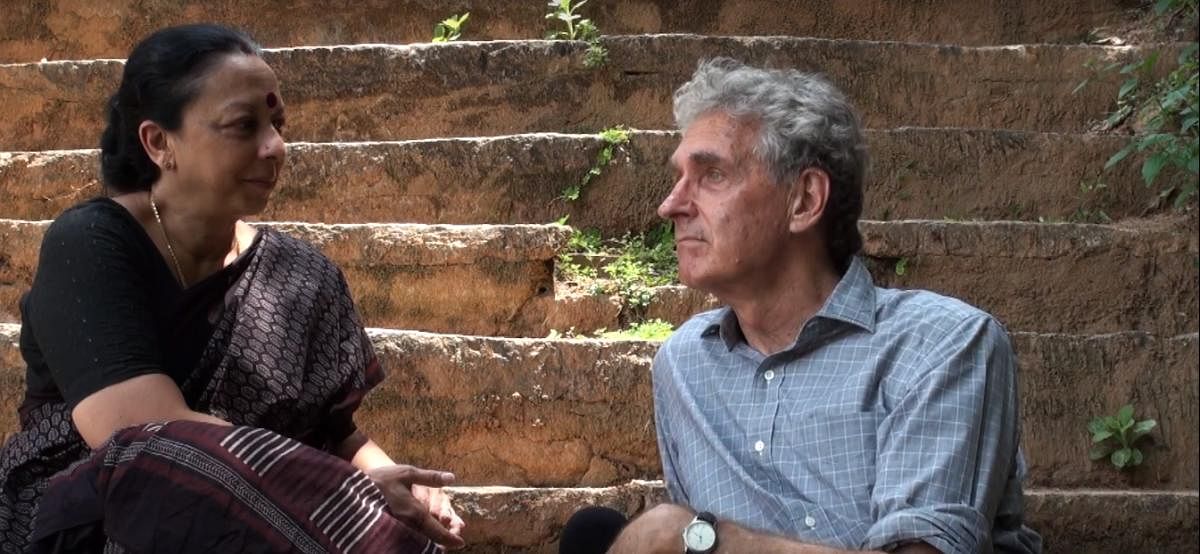
An event titled ‘Pattabhi 100 –Samskara 50’ was held on February 16 at Alliance Francaise to mark the birth centenary of legendary director Pattabhirama Reddy and the completion of 50 years of his film ‘Samskara’.
The film ‘Samskara’, directed by Pattabhirama Reddy in 1970s, heralded the parallel cinema movement in Karnataka and is seen as a major turning point in the cinematic history of Sandalwood.
A documentary titled ‘Revisiting Samskara’ was screened at the event. It was a tribute to Pattabhirama Reddy and Snehalata Reddy ,his wife, highlighting their multi-faceted creative and political contributions.
Revisiting the environs of the 1970s, the documentary also talked about the relevance of historicity and its pertinence in present times.
In a discussion held prior to the screening, chief guests former additional chief secretary to Government of Karnataka Chiranjeevi Singh, writer and filmmaker Dr Baragur Ramachandrappa, critic and publisher Pustakamane Hariharapriya, film critic Dr Vijayamma, and Australian Cinematographer Tom Cowan spoke about their memories with Pattabirama Reddy and Snehalata Reddy and their contributions to the society.
Talking about how Pattabhi lives on forever in people’s memories, Chiranjeevi Singh also rued the fact that Pattabhi was never given the recognition he deserved in Karnataka when he was alive.
He went on to add that Pattabhi was also a great mathematician who was among the few to solve Fermat’s Last Theorem.
Pustakamane Hariharapriya raised the question of why Pattabhi was never included in the line of ‘Bharatiya Sahitya Nirmanakararu’ by Kendra Sahitya Academy.
Talking about Pattabhi and Snehalata Reddy’s contributions to Kannada literature, he placed on record his objections to critical comments about the couple in various books.
Dr Vijayamma, also a close friend of Snehalatha Reddy, spoke about their relationship and how Snehalata always stood up for what was right.
Talking about the time when Snehalata was behind bars during the emergency in India, she says that Snehalata fought against the brutal treatment given to the prisoners in the jail at that time.
That she was a thinker ahead of her time was also highlighted in the many feminist elements in ‘Sita’, a play written by Snehalata.
Baragaru Ramachandrappa, who spoke towards the end, revealed his unhappiness at how Pattabhi was being forgotten in the state.
He suggested screening Pattabhi’s films in film festivals to rectify this. “Making a film from a book is not an easy task. One has to retain the essence of the book and Pattabhi excelled in it,” said Baraguru Ramachandrappa.
Remembering the good times he spent with Pattabhi and Snehalata, Tom Cowan said that Snehalata had always supported him in every step in becoming a cinematographer.
“ I was 25 years younger to Pattabhi. But I was made to feel like an equal by him,” he says.
Documentary on Samskara brings back memories for many
The documentary ‘Revisiting Samskara’ was helmed by Tom Cowan. He was approached by Nandana, Pattabhi’s daughter, with the idea. Talking to Metrolife, Nandana says that ‘Samskara’ has haunted her for several years and that she always wanted to explore and dig deeper into the film. Nandana is the founder executive director of the ‘The Concerned for Working Children (CWC)’, a non-profit organisation based in Bengaluru.
“My colleague and I took a ride to Sringeri via Vaikuntapura, where the film was shot. Walking into the village felt like walking into the frames of ‘Samskara’. I reached out to Tom, who later came down to India, and that is how the documentary came about,” she says.
The documentary features the cast of ‘Samskara’ talking about their experiences and memories of shooting the film back then. It was a time when not many knew about acting and its techniques. “ We were all very raw actors. We did not even have rehearsals before a shot,” says one of the cast.
Veteran cinematographer Tom Cowan, who shot the film, says, “Coming here has sort of jogged my memory.”
“We had to shoot 900 shots in 30 days. That is 30 shots per day. Each of it was meticulously shot and I think this was the great strength of the film,” says Tom in the documentary.
‘Samskara’ was initially banned by censor board
Samskara (Funeral Rites), a 1970 Kannada film based on the novel written by UR Ananthamurthy, was directed and produced by Pattabhirama Reddy. This was a path-breaking venture in Kannada film industry.
However, it was initially banned by the Madras Censor Board because it was felt that the strong anti-caste message being conveyed could spark tensions among the public. The ban was later revoked by the Union Ministry of Information and Broadcasting and the film went on to win several awards at national and international levels, including the National Award for Best Feature Film in 1970.